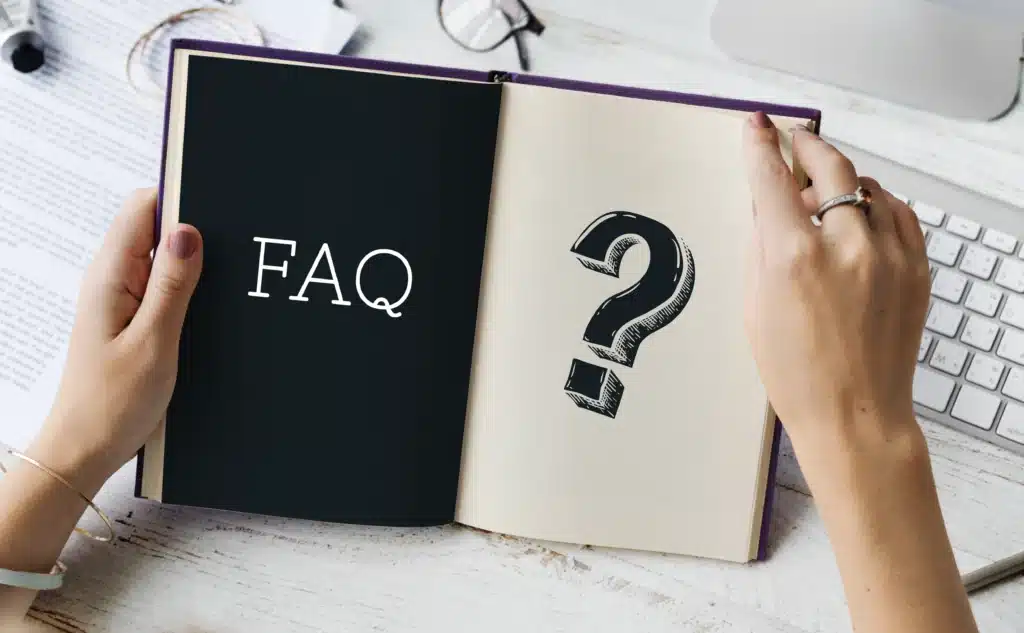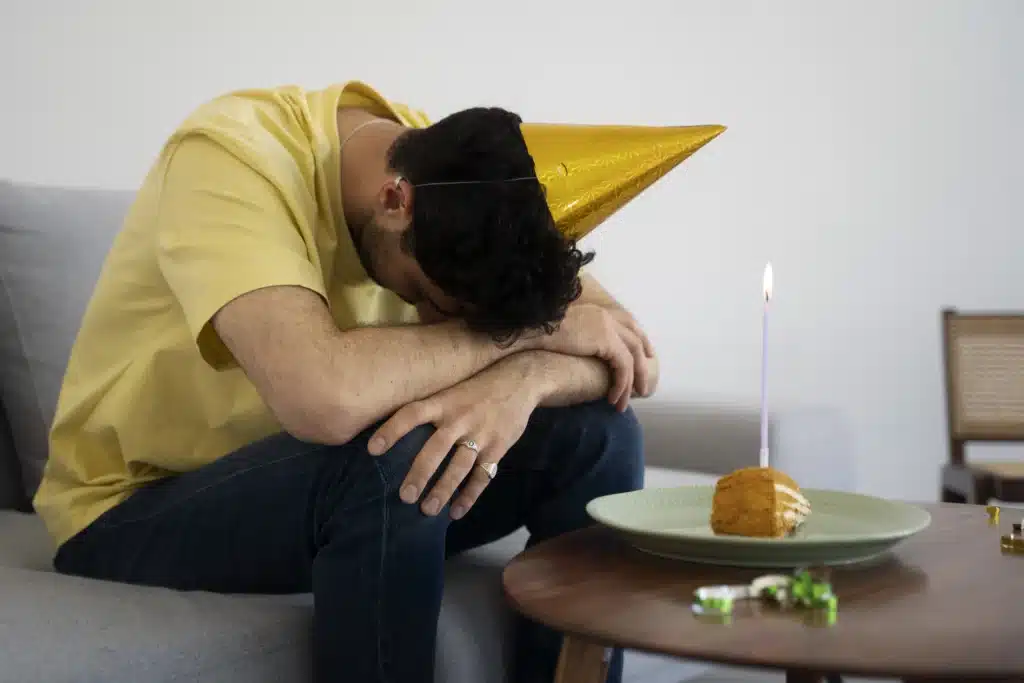Birthday depression, also known as “birthday blues,” refers to a psychological condition characterized by feelings of sadness, anxiety, or a general sense of anxiousness encountered by people on or around their birthdays.
While birthdays are traditionally associated with joy and celebration, some people may find themselves with symptoms of birthday depression.
Recognizing the symptoms of birthday depression is crucial, as it helps individuals, their friends, and their family members understand and talk about the emotional challenges that can occur on this extraordinary day. By identifying these symptoms early, it becomes possible to provide support, seek help, and develop coping strategies to get rid of birthday depression.
We will shed light on the often-overlooked symptoms of birthday depression. By exploring the common symptoms, potential causes, and coping strategies, this article aims to provide valuable insights for those who may be affected by birthday depression and those who want to support them. Ultimately, our goal is to promote empathy, awareness, and mental well-being on birthdays and beyond.
Table of Contents
ToggleCommon Symptoms of Birthday Depression.
Let us take a look at the common symptoms of depression that need to be addressed:
Emotional Symptoms of Birthday Depression
- Ruminating on the past and goals unaccomplished (e.g., not getting married or having kids yet)
- Stressing about how much time you have left to live.
- Feeling down or sad on your birthday is a common sign of birthday depression. Instead of feeling happy and excited, you might feel the opposite.
- You might find yourself getting easily annoyed or irritated by things that usually don’t bother you. Little things can feel like a big deal.
- Birthday anxiety is a thing too. You might worry about the day, what people expect from you, or whether it will be a good day at all.
Behavioral Symptoms of Birthday Depression
- When you’re dealing with birthday depression, you might want to be alone more than usual. You might withdraw from social events or even avoid talking to friends and family.
- You might notice changes in your daily routine. Things you used to enjoy might not interest you anymore, or you might struggle to motivate yourself to do regular tasks.
- Some people with birthday depression try to avoid celebrating their birthdays altogether. They might cancel plans or not tell anyone it’s their special day.
Physical Symptoms of Birthday Depression
- Feeling tired all the time, even if you’ve been sleeping enough, can be a physical sign of birthday depression. It’s like your energy just drains away.
- Your sleep patterns might change. You could have trouble falling asleep, wake up frequently during the night, or have vivid and disturbing dreams.
- Your appetite might go through ups and downs. Some people eat more when they’re feeling down, while others may lose their appetite and not feel like eating much.

Causes of Birthday Depression
Personal Factors
- Past Trauma: Sometimes, birthday depression can be linked to past difficult experiences or trauma that happened around your birthday. Painful memories can resurface and affect your mood.
- Unmet Expectations: If you have high expectations for your birthday, like grand celebrations or gifts, and those expectations aren’t met, it can lead to disappointment and sadness.
- Aging: As we grow older, birthdays can sometimes trigger feelings of unease about getting older. You might worry about reaching certain milestones or feel like time is slipping away.
Social Factors
- Loneliness: Feeling alone or disconnected from others can intensify birthday depression. If you don’t have close friends or family to celebrate with, it can be especially tough.
- Social Pressure: Society often puts pressure on us to have the “perfect” birthday, with lavish parties and celebrations. This pressure can be overwhelming and cause stress.
- Comparison: It’s easy to compare your own life and accomplishments to others, especially in the age of social media. Seeing others’ seemingly perfect birthday celebrations can make you feel inadequate.
Cultural and Societal Influences.
- Cultural Attitudes Toward Birthdays: Different cultures have varying attitudes and traditions related to birthdays. Some cultures place a lot of importance on birthdays, while others don’t. These cultural norms can influence how you feel about your birthday.
- Social Media’s Impact: Social media platforms can amplify the pressure to have a fantastic birthday. Seeing friends’ posts about their celebrations can make you feel like your own isn’t measuring up.
Coping Strategies for Birthday Depression
Self-Care
Self-care is a fundamental aspect of dealing with birthday depression. Prioritizing your mental health is crucial during this time. This can involve setting aside moments for self-reflection and introspection.
Engaging in practices like meditation, yoga, or simply doing activities that bring you joy and relaxation can help alleviate some of the emotional strain associated with birthday depression. Remember that taking care of your mental health is not a sign of weakness but a powerful step towards resilience.
Seeking professional help is another important facet of self-care. If you find that your birthday depression feels overwhelming and persistent or is significantly impacting your daily life, consider reaching out to a mental health professional.
They can offer valuable guidance, therapy, or even medication if necessary, tailored to your specific needs, helping you navigate these difficult emotions with expertise and support.
Communication
Don’t underestimate the healing power of communication during your struggle with birthday depression. Sharing your feelings with close friends and family members can be incredibly comforting.
While they may not fully understand the difficulties of what you’re going through, their support and empathy can make a world of difference.
Open, honest conversations can help you feel less isolated and more understood, which is especially important during this time.
Consider redefining what a birthday celebration means to you. It doesn’t have to follow traditional norms if those don’t align with your priorities. Instead, think about how you’d genuinely like to mark the day.
Whether it’s a quiet day spent in solitude or a small gathering with a few trusted loved ones, personalizing your celebration can make it more meaningful and enjoyable.
Mindfulness and Gratitude
Practicing mindfulness can be a valuable tool in managing the emotional challenges of birthday depression. Mindfulness techniques, such as deep breathing exercises or meditation, can help you stay present and reduce anxiety or sadness.
These practices can be particularly beneficial as you approach your birthday, helping you stay grounded and focused on the moment rather than worrying about the past or future.
Focusing on positivity is also essential. Instead of dwelling on unmet expectations or past regrets, actively shift your perspective towards gratitude.
Reflect on your achievements, the relationships that matter most to you, and the things you’re grateful for in your life. This change in mindset can gradually improve your overall mood and help you find moments of joy, even on your birthday.
Tips to Beat Birthday Depression!
Here are some practical tips to help you beat the birthday blues:
1. Start the day on a positive note:
Begin your special day with a positive mindset. Think about the things you’re grateful for in your life. Treat yourself to a delightful breakfast or engage in an activity that brings you joy, whether it’s watching a favorite movie in bed or going for an early morning run.
2. Celebrate in a way that suits you:
Remember, your birthday is your day. Choose to celebrate it in a manner that resonates with your preferences. If you enjoy lavish celebrations, plan accordingly. If spending quality time with loved ones makes you happier, make arrangements for that instead.
3. Avoid overplanning:
Keep things simple to reduce stress. Overloading your schedule with too many plans can lead to unnecessary pressure on your special day.
4. Set realistic expectations:
Be honest with yourself about what you can expect from your birthday, especially concerning family interactions. Focus on the positive gestures from friends and family, no matter how small they may be.
5. Stay occupied:
If you find the birthday blues creeping in, consider staying busy to keep your mind off negative thoughts. Engage in activities that distract you from any sadness you may be feeling.
6. Maintain a positive outlook:
Instead of dwelling on unmet goals or regrets, concentrate on your past accomplishments. This shift in perspective can boost your spirits and remind you of your achievements.
7. Communicate your birthday:
If you’re concerned that people might forget your birthday, don’t hesitate to remind them. It ensures that your loved ones remember your special day.
8. Limit sadness time:
While it’s okay to feel sad occasionally, it’s unproductive to dwell on it all day. Accept your emotions, acknowledge them, and then strive to shift your focus towards a more positive mindset.
9. Deal with grief positively:
Sometimes, it’s necessary to grieve for losses or the passage of time. Embrace your feelings and allow yourself to make peace with them, rather than resisting them.
10. Transform sadness into growth:
View your birthday blues as an opportunity for introspection and personal development. Analyze what’s causing these feelings and consider strategies to address any underlying issues.
11. Create special moments:
Plan an activity that genuinely excites you. Whether it’s watching a show, getting a massage, or dining out, select something that lifts your spirits and helps you focus on joy.

Books to Combat Birthday Depression
- Beyond Birthday Depression: Reclaiming Your Special Day is a book that provides help for people who experience birthday depression. It covers a wide range of topics, including the causes of birthday depression, common feelings, tips for coping, and how to overcome negative self-talk.
- Overcoming Depression – Get Happy Again is a self-help book that provides a step-by-step guide to overcoming depression, anxiety, and panic attacks. It covers a wide range of topics, including CBT, relaxation techniques, mindfulness, self-care, and building positive relationships.
- Build the Life You Want is a book that provides a practical guide to achieving happiness by building and strengthening the four pillars of happiness: family, friendship, work, and faith.

Frequently Asked Questions
1. Are birthday depression and clinical depression the same?
No, they are not the same. Symptoms of Birthday depression are typically temporary and tied to the birthday event, while clinical depression is a long-term mental health condition. However, if birthday depression becomes severe and persists, it’s essential to seek professional help.
2. Why are birthdays so hard?
Birthdays can become more complicated as we get older. We might feel uneasy about aging, get disappointed if our expectations aren’t met, or set our hopes too high.
Our perspective on birthdays can change, and family dynamics and comparisons with others can make things more complex. It’s okay to have mixed feelings about birthdays, but it’s important to find ways to handle them positively and focus on personal growth and self-acceptance.
3. Are birthday blues real?
Yes, birthday blues are indeed real, and they are quite common. However, the intensity of these feelings can vary from person to person.
4. Is it okay to skip celebrating my birthday if I’m not feeling up to it?
Yes. It’s okay to skip birthday celebrations if you’re not in the right emotional space. You should prioritize your well-being and do what feels right for you. For some years, taking a break from celebrations might be the best choice.
5. How can I support a friend or family member who’s experiencing birthday blues?
If someone you care about is dealing with birthday blues, offer your support by listening to them and being empathetic. You can also help plan a low-pressure, enjoyable celebration or offer to spend quality time with them. It’s essential to be understanding and respectful of their feelings.
6. Who can experience birthday blues?
Anyone can experience birthday blues, and it’s not limited by age. People of all ages may find themselves feeling down on or around their birthdays.
7. What are some causes of the birthday blues?
Various factors can contribute to birthday blues, including external circumstances. For instance, the uncertainty and isolation brought about by events like the COVID-19 pandemic may have intensified these emotions for some individuals.
However, birthday blues can also stem from other sources and personal experiences.
Wrapping up!
In simple terms, symptoms of birthday depression might appear and can make your special day sad. We discussed how you might feel down, change your behavior, or even have physical issues like tiredness or appetite changes.
But here’s the important part: If you feel this way, ask for help. Talk to friends, family, or a pro. You’re not alone, and things can get better.
Remember, there’s hope for a happier future. Birthdays might be tough now, but with help and some tricks, you can find joy not only on your special day but every day. You’re on the path to feeling better, and better days are ahead.
“May your birthday be filled with the warmth of sunshine, the happiness of smiles, and the sound of laughter.“

